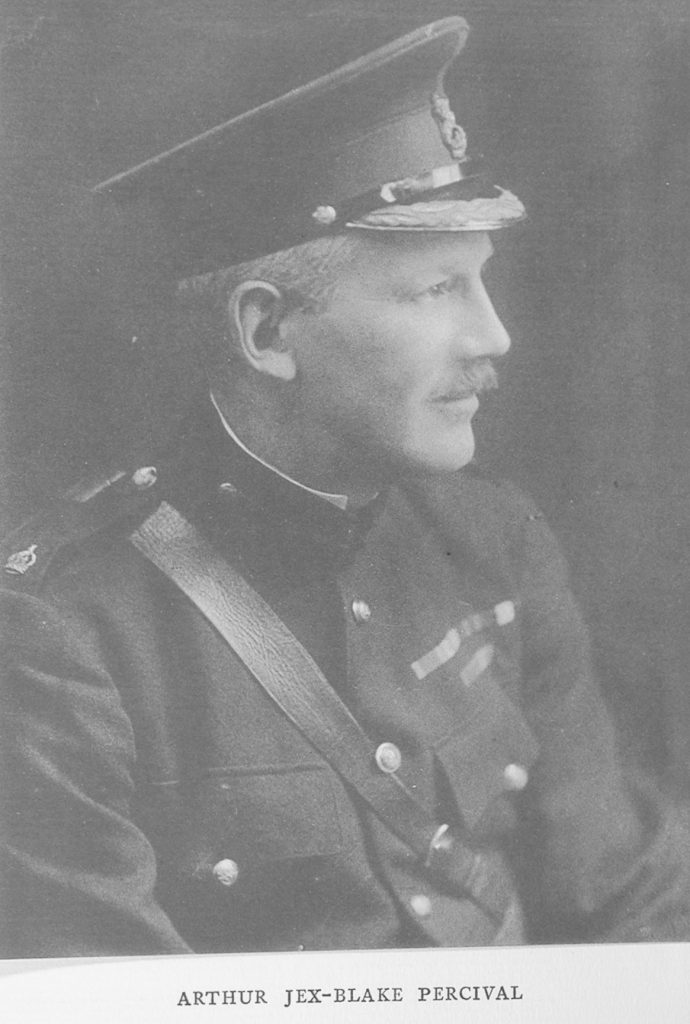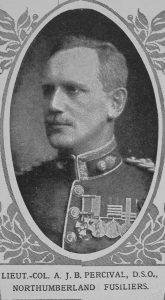MAJOR (TEMPORARY LIEUT.-COL.) A. J.-B. PERCIVAL, D.S.O.
THE NORTHUMBERLAND FUSILIERS
ARTHUR JEX-BLAKE PERCIVAL, D.S.O., was the youngest surviving son of the Right Reverend John Percival, D.D., Bishop of Hereford.
He entered Marlborough College in 1885, but came on to Rugby in 1887, when his father was appointed Headmaster of the School. He was in the XV in 1889. He was gazetted to the Northumberland Fusiliers in 1892, and promoted Lieutenant in 1894. He served in the Nile Expedition of 1898, taking part in the Battle of Khartum and receiving the Egyptian Medal with Clasp.
In the South African War, 1899-1902, he was in the actions of Belmont and Modder River, and was afterwards on the Staff, being three times men-tioned in Despatches, and receiving the D.S.O., 1900, and the two Medals with six Clasps. He was promoted Captain in 1900. He saw active service in the Egyptian Army under Lord Kitchener from 1903 to 1908, was in command of the Camel Corps, and served in operations against the Nyam-Nyam tribes, and in southern Kordofan, adding two Clasps to the Egyptian Medal and receiving the 4th Class of the Medjidich.
He was promoted Major in 1908, and later was employed on the Staff at the War Office and at the Staff College.
He went to the Front at the beginning of the War, as General Staff Officer to Major-General Munro, Commander of the 2nd Division of the First Army Corps, and during the first eleven weeks of the War was twice mentioned in Despatches, and was one of the first English officers to receive the Cross of the Legion of Honour (Croix d’Officier). A week before his death it was decided that he was to be given a Brigade immediately. He was told of this, but did not live long enough to be gazetted.
He was killed by shell, with four other officers of the Staff of the First and Second Divisions, who had met for a conference in the Château of La Hooge. General Lomax (O.R.), who was present at this conference, was wounded, and subsequently died of his wounds. He fell on October 31st, 1914, in his 44th year.
Officers of all ranks testified to the gallantry of this eminent soldier, and the loss which his death caused to the Nation and the Army.
Field-Marshal Lord Methuen, G.c.n., G.C.V.O., C.M.G., wrote:-
“I had no officer serving under me in the South African War whose service as a Regimental Officer I valued more highly. He was a born leader of men, of splendid courage, and possessing a character which inspired all with whom he came in contact.”
General Gorringe, cCB., C.M.G., D.S.O., said:-
“He was the best Staff Officer I have ever had. I don’t say this only now. I have said so for some time, and had he been given, as he deserved, a Command during the War, he would have won still higher honours.”
A brother Officer wrote:-
“He and I were in the Egyptian Army together, and I learnt out there to admire his wonderful energy and great strength of character. I shall never forget the day he rode quietly into Wau, in the Bahr el Ghazal, on the date he said he would arrive, after the most extraordinary journey, in which his great qualities had had full play. His Arabs simply worshipped him. By his death we have lost one of the best officers in the Army, and at a time when men of his type are priceless.”
Others spoke in these terms:
“A very gallant soldier, loyal, straight, and the best of friends, with never an unkind word.”
“He was one of the few men I have ever met who apparently did not know fear.”
“The whole Army knew his splendid qualities. I always used to talk of him as the bravest man I have ever known. He simply knew no fear.”
He married, in 1907, Cecil, daughter of Charles Henry Henland, but left no children.
Source : Memorials Of Rugbeians Who Fell In The Great War Vol 1
Source : The Illustrated London News 21st Nov 1914

